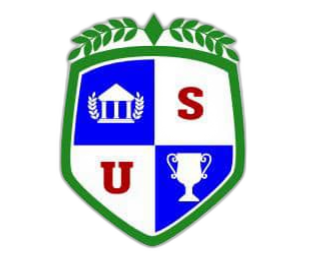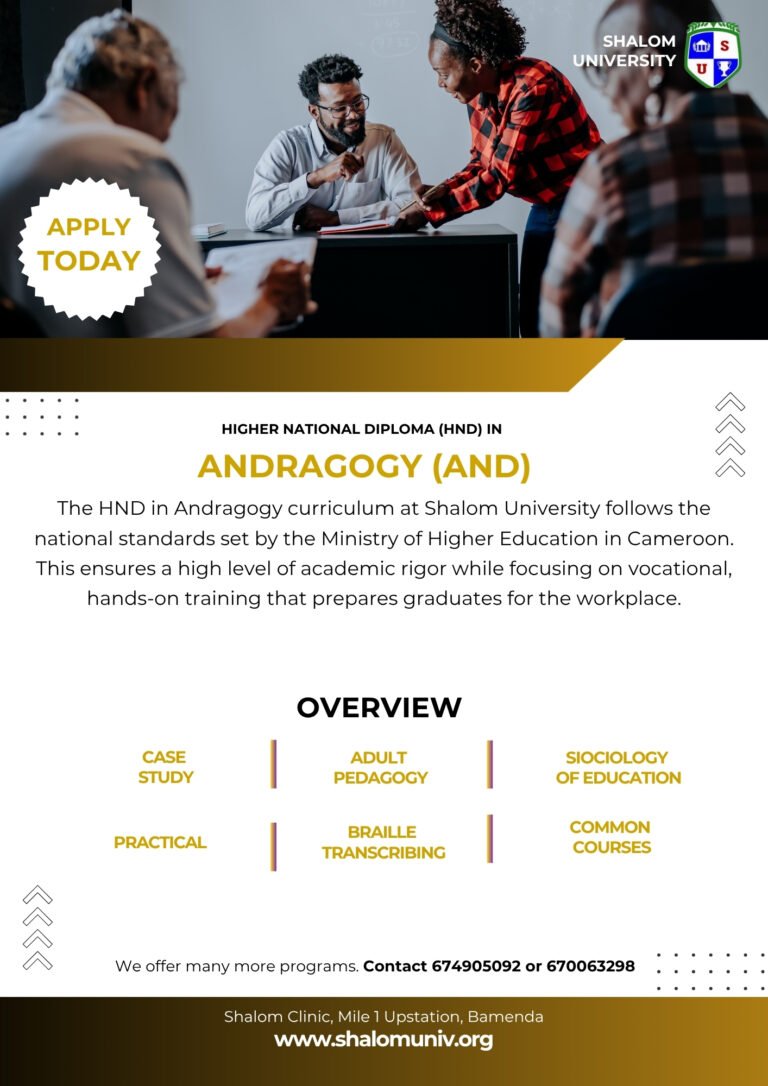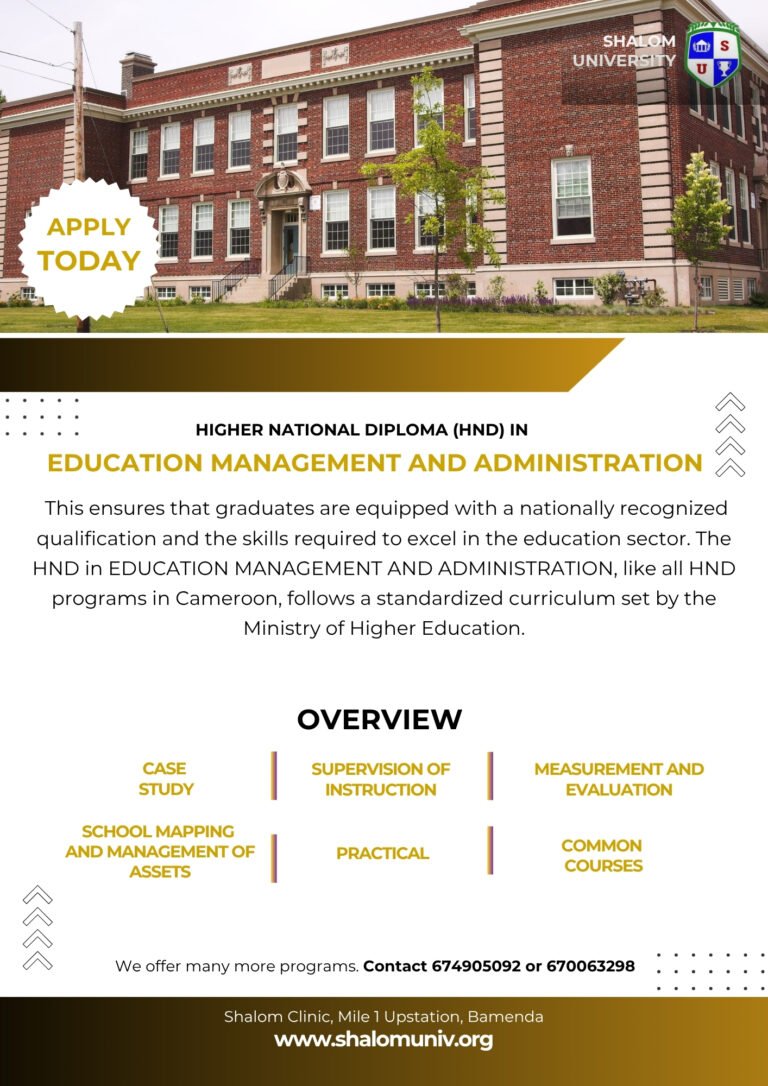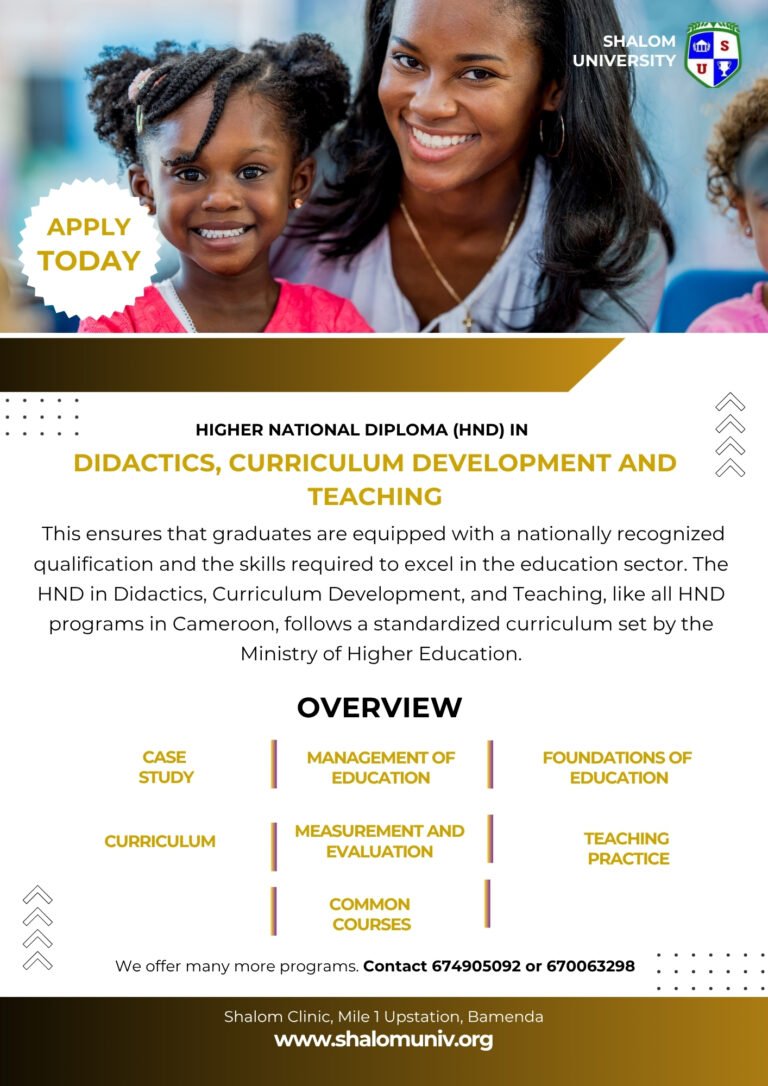In Cameroon, fostering an inclusive educational system that caters to the diverse learning needs of all children, including those with special needs, is a critical step toward ensuring equity and social justice. The demand for qualified educators who can provide specialized instruction and support to these learners is growing, and addressing this requires dedicated and comprehensive training. The HND in Special and Inclusive Education (SPE) at Shalom University in Bamenda is specifically designed to meet this demand. This program provides aspiring and current educators with the theoretical knowledge, practical skills, and compassionate mindset needed to excel in inclusive educational settings throughout Cameroon.
The curriculum at Shalom University is tailored to the Cameroonian context, blending core special education principles with hands-on training in adapted teaching methods, community-based interventions, and essential skills like Braille and Sign Language. Graduates are prepared not only to manage inclusive classrooms but also to contribute to a broader culture of acceptance and empowerment for learners with special needs.
The SPE Curriculum at Shalom University
The HND in Special and Inclusive Education program at Shalom University is structured around a set of core papers that provide a comprehensive and practical education in the field.
Paper: Case Study
The Case Study paper is a vital component that integrates all the theoretical knowledge and practical skills gained throughout the program. It challenges students to analyze complex situations involving learners with special needs, from developing an individualized education plan (IEP) for a child with a learning disability to addressing behavioral challenges in an inclusive classroom. This is particularly relevant for educators in Cameroon, who must navigate varying school resources, cultural attitudes, and family dynamics.
The course trains students to:
- Analyze real-world educational challenges: Based on a given case, students evaluate a learner’s specific needs, assess their educational environment, and identify potential barriers to their inclusion.
- Identify critical issues and underlying causes: They pinpoint specific problems related to learning disabilities, physical impairments, or social-emotional challenges and explore the underlying factors.
- Propose evidence-based interventions: Students formulate practical recommendations based on special education principles, adapted pedagogical tools, and the learner’s unique profile. For example, a case study might involve a child with a hearing impairment, requiring a proposal for integrating American Sign Language (ASL) into their learning process and engaging their family.
- Defend their decisions: During formal presentations, students must justify their analysis and proposed interventions, demonstrating their critical thinking and communication skills, which are essential for effective collaboration with parents, specialists, and school administration.
Paper: Special Didactics and Adapted Pedagogic Tools
This paper focuses on the specific teaching methods and tools required to effectively educate learners with diverse needs. It moves beyond standard pedagogical practices to explore specialized techniques that promote learning and inclusion in the classroom.
Key topics include:
- Differentiated Instruction: Techniques for tailoring instruction to meet the individual learning styles, abilities, and needs of all students in an inclusive classroom.
- Assistive Technology: An introduction to various assistive technologies and low-tech tools that can support learners with disabilities, given the resources available in Cameroon.
- Universal Design for Learning (UDL): Applying the principles of UDL to create flexible learning environments that accommodate diverse learners.
- Adapted Materials: Creating and adapting learning materials, from visual aids to modified assignments, to suit the needs of learners with special needs.
Paper: Community Based Rehabilitation
This paper provides students with a broader understanding of how to support individuals with special needs beyond the school setting, within their own communities. It emphasizes a holistic approach that involves families and local resources.
The curriculum addresses:
- Assessment of Needs: Techniques for assessing the needs of individuals with disabilities and their families within their community context.
- Rehabilitation Services: Coordination of services for rehabilitation, including physical therapy, occupational therapy, and speech therapy.
- Family and Community Engagement: Engaging families and community members in the rehabilitation process to ensure sustainability and support.
- Advocacy and Awareness: Strategies for advocating for the rights of individuals with special needs and raising community awareness to reduce stigma.
Paper: American Sign Language & Braille Transcribing
These papers provide students with essential practical skills for communicating with and teaching learners with visual and hearing impairments. American Sign Language (ASL) is a widely recognized standard, while Braille is critical for literacy among the visually impaired.
The curriculum covers:
- ASL Fundamentals: Learning the basics of ASL, including fingerspelling, grammar, and vocabulary, to facilitate communication with hearing-impaired students.
- Sign Language Culture: Understanding the deaf community and culture, which is important for promoting cultural sensitivity.
- Braille Literacy: Learning how to read and write Braille, a crucial skill for teaching and creating accessible materials for visually impaired students.
- Braille Transcribing: Using Braille transcribers to convert text into Braille, ensuring that learning materials are accessible.
Paper: Mental Health and Autism
This paper addresses two critical and often misunderstood areas of special education: mental health and autism spectrum disorders. It provides students with the knowledge and sensitivity needed to support learners with these conditions effectively.
The curriculum addresses:
- Mental Health in Childhood: Common mental health challenges in children and adolescents, such as anxiety, depression, and trauma-related disorders.
- Supporting Autistic Learners: Strategies for teaching and supporting autistic learners, including managing social communication challenges and sensory sensitivities.
- Behavioral Management: Techniques for understanding and managing challenging behaviors in learners with mental health issues or autism.
Paper: Guidance and Counseling
This paper provides students with the foundational skills of guidance and counseling, which are essential for supporting learners with special needs, their families, and the wider school community.
The curriculum covers:
- Counseling Techniques: Basic counseling skills, including active listening, empathy, and providing emotional support.
- Individualized Support: Developing counseling strategies that address the unique social and emotional needs of learners with special needs.
- Family Counseling: Techniques for counseling families to help them cope with the challenges of raising a child with special needs.
Paper: Assessing Learners with Special Needs
This paper focuses on the specialized assessment techniques used to identify and evaluate learners with special needs, which is the first step toward providing appropriate support.
The curriculum covers:
- Formal and Informal Assessment: Using a variety of assessment methods, including standardized tests, classroom observations, and portfolios.
- Developing IEPs: Using assessment data to develop individualized education plans (IEPs) that set specific, measurable, achievable, relevant, and time-bound goals.
Paper: Child Protection
In Cameroon, child protection is a critical issue. This paper provides students with the knowledge and skills to identify signs of abuse, neglect, or exploitation and to follow appropriate protocols for reporting and intervention.
The curriculum covers:
- Signs of Abuse and Neglect: Recognizing the physical, emotional, and behavioral signs of child abuse and neglect.
- Reporting Procedures: Understanding the legal and ethical requirements for reporting child abuse in Cameroon.
- Creating Safe Environments: Strategies for creating safe and supportive school and community environments for all children.
Paper: Teaching Practice
This is the hands-on, practical training component of the program, where students apply their theoretical knowledge in a supervised, real-world educational setting. Practical experience is fundamental to developing the competencies needed for effective teaching in an inclusive classroom.
The practical training includes:
- Supervised Teaching: Undergoing supervised teaching placements in inclusive classrooms in Cameroon, gaining direct experience with learners with and without special needs.
- Lesson Planning: Developing and delivering adapted lesson plans that are engaging, well-structured, and aligned with individual student needs.
- Inclusive Classroom Management: Practical experience in managing an inclusive classroom, fostering a positive learning environment, and addressing student diversity.
Promoting Inclusion and Empowerment
Graduates of the HND in Special and Inclusive Education from Shalom University are well-prepared to enter the workforce in various roles across Cameroon’s educational and social sectors. They can serve as special education teachers, inclusion coordinators, resource room teachers, or work for NGOs and community-based organizations focused on disability and inclusion. Their proficiency in specialized didactics, adapted tools, rehabilitation, sign language, Braille, and assessment, coupled with a deep understanding of mental health, child protection, and the Cameroonian context, makes them invaluable assets to the education system. The Case Study paper ensures that they are not just theoretically sound but also adept at applying their knowledge to solve real-world challenges. By providing a comprehensive and contextually relevant education, Shalom University plays a significant role in fostering a more inclusive and equitable society for all learners in Cameroon.




